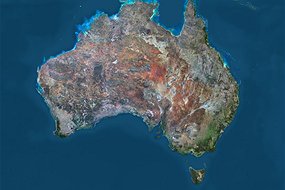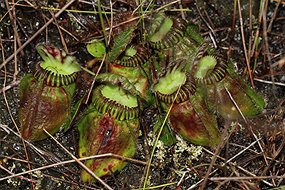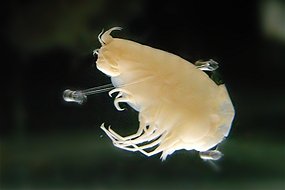Explore Environment and Nature
RSS (Environment and Nature News in Science web feed) News in Science
The subdued roar of the Boxing Day earthquake
Thursday, 3 September 2015
That subdued roar is the sound of the massive earthquake that caused the Boxing Day tsunami in 2004.
 Earth has three trillion trees, and falling
Earth has three trillion trees, and falling
Thursday, 3 September 2015
 Wild Cape York and glittering reef
Wild Cape York and glittering reef
Wednesday, 2 September 2015
 Almost all seabirds are eating plastic
Almost all seabirds are eating plastic
Tuesday, 1 September 2015
 Red sprites at night, astronaut's delight
Red sprites at night, astronaut's delight
Friday, 28 August 2015
RSS (Environment and Nature Nature Features web feed)Nature Features
Colours of the Great Victoria Desert
Travel to Australia's largest desert in these beautiful photos of the rich plant and animal life that lives along Googs Track taken by the Friends of the Great Victoria Desert conservation group.
RSS (Environment and Nature Science Features web feed)Science Features

Five things you probably don't know about Australia
Every schoolkid knows that Australia is gradually heading north - but we're also turning sideways, rising up and down, and entire cities are moving further apart. How do we know all this? Because of supermassive black holes.
RSS (Environment and Nature Ask an Expert web feed)Ask an Expert
The science of earthquakes explained
Earthquakes can cause immense damage to buildings and infrastructure, trigger tsunamis, and reshape the Earth's surface with their force. But how do earthquakes begin, and why are some much more devastating than others?
RSS (Environment and Nature Dr Karl's Great Moments In Science web feed) Great Moments in Science
 How humankind has changed our planet
How humankind has changed our planet
Tuesday, 21 February 2017
Many factors have contributed to how Earth has changed over time, but humankind has been a major contributor in a relatively short period of time, writes Dr Karl.
 The collective intelligence of animals
The collective intelligence of animals
Wednesday, 21 December 2016
The collective intelligence of a flock helps protect and save energy, keep them on track when migrating and share food discoveries, as Dr Karl explains.
RSS (Environment and Nature Science Quizzes web feed) Science Quizzes
 Could you pass Year 10 science?
Could you pass Year 10 science?
Wednesday, 8 February 2017
How good is your knowledge of basic science?
RSS (Environment and Nature Science Games web feed) Science Games
 Chemistry quiz
Chemistry quiz
Wednesday, 24 February 2010
Is your chemistry knowledge as light as helium or as heavy as plutonium?
RSS (Environment and Nature Photos web feed) Photos

Australia's rock stars revealed
The dramatic beauty of Australia's iron ore country is the star of the 2015 Top GeoShot photographic competition.
RSS (Environment and Nature Science Careers web feed) Science Careers
 Geneticist
Geneticist
Tuesday, 8 December 2009
Kathy Belov's love of science is in her genes. Watch Ace Day Jobs and find out how her work as a geneticist helps Tasmanian devils.
 Aquaculturalist
Aquaculturalist
Tuesday, 17 November 2009
Phillippa Dean is fascinated by fish, all day, every day. Watch Ace Day Jobs to find out how she became an aquaculturalist.











